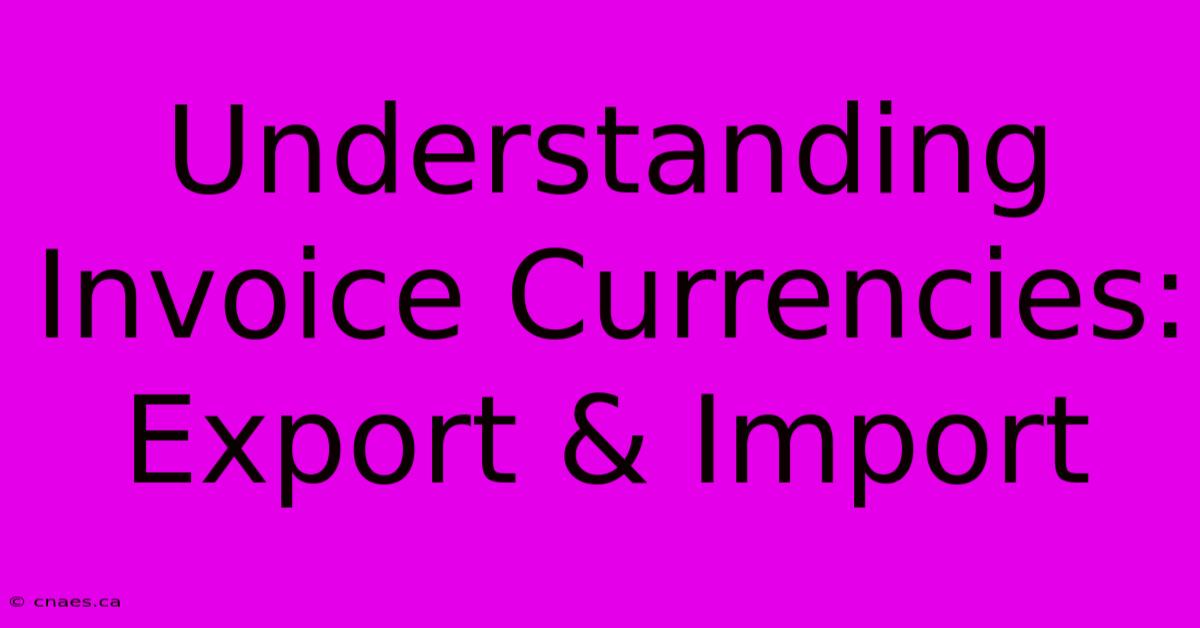Understanding Invoice Currencies: Export & Import

Discover more detailed and exciting information on our website. Click the link below to start your adventure: Visit My Website. Don't miss out!
Table of Contents
Understanding Invoice Currencies: Export & Import
Navigating international trade can be a confusing maze, and one of the first hurdles you'll face is figuring out invoice currencies. This article will break down the basics and help you understand the ins and outs of choosing the right currency for your export and import invoices.
Why Currency Matters:
You might think, "Isn't it just about the money?" Well, yes, but it's not that simple. The currency you choose on your invoice can affect:
- Exchange rates: Fluctuations can eat into your profits or even lead to losses if you're not careful.
- Payment terms: Some currencies are more stable than others, making them more attractive for long-term payment plans.
- Legal compliance: Different countries have different regulations about currency usage.
Choosing the Right Currency:
Here's a quick guide to help you decide:
1. The Buyer's Preference: Always check what currency your buyer prefers. They might have specific reasons for wanting a certain currency, like having a local bank account or needing to avoid exchange rate fees.
2. Your Business Needs: Consider your own financial situation. Do you have a bank account in the buyer's currency? Are you comfortable managing exchange rate risks?
3. The Stability of the Currency: A stable currency like the US Dollar or Euro might be more attractive to both you and your buyer, as it offers more predictable exchange rates.
4. The Market Standard: Some industries have standard currencies. For example, oil is often traded in US Dollars.
Example: Exporting to Europe:
Let's say you're exporting goods from the US to Germany. Here are a few options:
- US Dollar: You're comfortable with this currency, but your German buyer might have to pay exchange rate fees.
- Euro: This might be the most convenient for your buyer but could expose you to exchange rate fluctuations.
- Other Currencies: You might consider the British Pound or Swiss Franc, depending on your buyer's preference and the industry standard.
Tips for Managing Currency Risks:
- Lock in exchange rates: Use a forward contract or options to protect yourself against unfavorable exchange rate movements.
- Diversify your currencies: Hold a basket of currencies to reduce your exposure to single currency risks.
- Consult with an expert: Talk to a financial advisor or foreign exchange specialist for personalized guidance.
Final Thoughts:
Choosing the right invoice currency is crucial for successful international trade. By understanding the factors involved and taking necessary precautions, you can minimize currency risks and ensure a smooth and profitable transaction. Remember, communication is key, so be clear with your buyer about your preferred currency and payment terms.

Thank you for visiting our website wich cover about Understanding Invoice Currencies: Export & Import. We hope the information provided has been useful to you. Feel free to contact us if you have any questions or need further assistance. See you next time and dont miss to bookmark.
Also read the following articles
| Article Title | Date |
|---|---|
| Europa League Spurs Lineup Vs Galatasaray | Nov 07, 2024 |
| Live Updates M6 Fatal Crash Motorway Shut | Nov 07, 2024 |
| Bayern Beats Benfica In Close Encounter | Nov 07, 2024 |
| Trump Victory Boosts Markets Worries Emerge | Nov 07, 2024 |
| Scotty Pippen Jr Targets Ham | Nov 07, 2024 |
